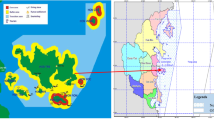Abstract
Using a generalist predator–prey system, we describe a theoretical aspect of economic and sustainability issues in the context of a complex ecosystem of Sundarbans coastal area, with a larger part located in Bangladesh and a smaller part in India. Predator species are considered only for the purpose of ecotourism and prey species are subject to fishing only. First we have studied the relevance of tourist entrance fee on total income gained from ecotourism and fishing. It is found that the total rent increases with the increase of entrance fee up to a certain threshold and then it decreases. Next the impact of fishing effort is studied on maximizing the total rent, and similar qualitative behavior is found as in the case of tourist entrance fee. Following this, the total rent is optimized in respect to both tourist entrance fee and fishing effort with three different level of tourists sensitivity on predator population. Result show that maximum total rent is always higher if more importance is given to ecotourism than fishing. Finally, MSY policy and its consequences on ecotourism and fishing are also studied. It is observed that MSY approach is a sustainable management policy to protect both the species even if the ecotourism is implemented along with fishing. This model can be used to determine the optimal choice of tourist entrance fee and fishing effort when the real data are available for the Sundarbans.










Similar content being viewed by others
References
Myers RA, Baum JK, Shepherd TD, Powers SP, Peterson CH (2007) Cascading effects of the loss of apex predatory sharks from a coastal ocean. Science 315(5820):1846–1850
Kar T (2005) Conservation of a fishery through optimal taxation: a dynamic reaction model. Commun Nonlinear Sci Numer Simul 10(2):121–131
Chakraborty K, Kar T (2012) Economic perspective of marine reserves in fisheries: a bioeconomic model. Math Biosci 240(2):212–222
Ghosh B, Pal D, Kar T, Valverde JC (2017) Biological conservation through marine protected areas in the presence of alternative stable states. Math Biosci 286:49–57
Paul P, Ghosh B, Kar T (2015) Impact of species enrichment and fishing mortality in three species food chain models. Commun Nonlinear Sci Numer Simul 29(1–3):208–223
Ghosh B, Kar T (2014) Sustainable use of prey species in a prey–predator system: jointly determined ecological thresholds and economic trade-offs. Ecol Model 272:49–58
Schaefer MB (1954) Some aspects of the dynamics of populations important to the management of the commercial marine fisheries. Inter-Am Trop Tuna Comm Bull 1(2):23–56
Clark CW (2006) The worldwide crisis in fisheries: economic models and human behavior. Cambridge University Press, Cambridge
Legović T, Klanjšček J, Geček S (2010) Maximum sustainable yield and species extinction in ecosystems. Ecol Model 221(12):1569–1574
Kar T, Ghosh B (2013) Impacts of maximum sustainable yield policy to prey–predator systems. Ecol Model 250:134–142
Ghosh B, Pal D, Legović T, Kar T (2018) Harvesting induced stability and instability in a tri-trophic food chain. Math Biosci 304:89–99
Wilen C, Wilen J (2012) Fishing down the food chain revisited: modelling exploited trophic systems. Ecol Econ 79:80–88
Boncoeur J, Alban F, Ifremer OG, Ifremer OT (2002) Fish, fishers, seals and tourists: economic consequences of creating a marine reserve in a multi-species, multi-activity context. Nat Resour Model 15(4):387–411
Kar T, Ghosh B (2013) Sustainability and economic consequences of creating marine protected areas in multispecies multiactivity context. J Theor Biol 318:81–90
Gallagher AJ, Hammerschlag N (2011) Global shark currency: the distribution, frequency, and economic value of shark ecotourism. Curr Issues Tour 14(8):797–812
Gallagher AJ, Vianna GM, Papastamatiou YP, Macdonald C, Guttridge TL, Hammerschlag N (2015) Biological effects, conservation potential, and research priorities of shark diving tourism. Biol Conserv 184:365–379
Lee JH, Iwasa Y (2011) Tourists and traditional divers in a common fishing ground. Ecol Econ 70(12):2350–2360
Kuo HI, Chen CC, McAleer M (2012) Estimating the impact of whaling on global whale-watching. Tour Manag 33(6):1321–1328
Ray SS, Chaudhuri K (1989) Lotka–Volterra prey–predator model with harvesting and environmental perturbations. Ecol Model 47(3–4):283–290
Matsuda H, Abrams PA (2013) Is feedback control effective for ecosystem-based fisheries management? J Theor Biol 339:122–128
Funding
The research of T.K. Kar is supported by the Council of Scientific and Industrial Research(CSIR), NO.25(0300)/19/EMR-II. The research of K. Pujaru is financed by Department of Science and Technology, INSPIRE, Government of India (No. DST/INSPIRE Fellowship/2017/IF170378, dated: 12th September, 2017).
Author information
Authors and Affiliations
Corresponding author
Rights and permissions
About this article
Cite this article
Kar, T.K., Das, D. & Pujaru, K. Joint impact of fishing and ecotourism in the Sundarbans: a theoretical perspective. Int. J. Dynam. Control 8, 792–804 (2020). https://doi.org/10.1007/s40435-019-00597-8
Received:
Revised:
Accepted:
Published:
Issue Date:
DOI: https://doi.org/10.1007/s40435-019-00597-8




